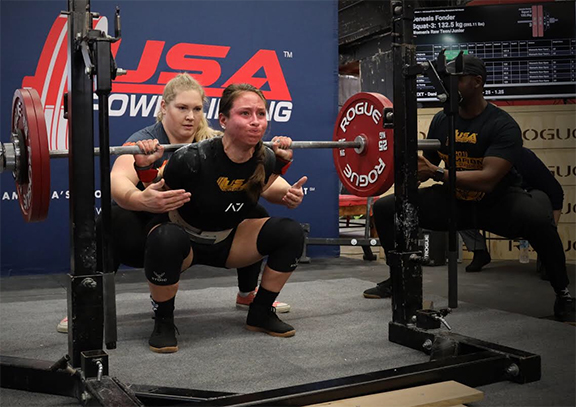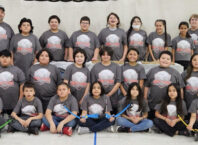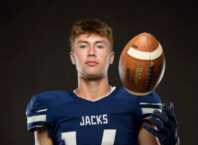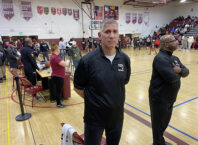By Dan Ninham
Powerlifting is a strength sport where the goal is to lift as much weight as possible. Your strength is measured by your maximal one repetition max in the squat, bench press, and deadlift. This strength is further refined by the subdivisions you’re in, such as weight-classes or age groups.
Jenesis Fonder, a member of the Mille Lacs Band of Ojibwe, is a powerlifter (Weight class: 63kg). “I’m a senior political science student at Carleton College and will be graduating in March of 2020. Besides that, I do personal training out of Los Campeones Gym and DBA Fitness,” said Jenesis, who lives in Minneapolis, Minnesota.
“Powerlifting was a part of my life growing up as it was first my dad’s hobby,” said Jenesis. “We had a small, makeshift gym in the basement where he would train and I liked to join him for his training sessions. First to watch, then he began to teach me form in a way that kept it fun and uplifting.”
“Powerlifting is a sport that is incredibly honest,” said Jenesis. “Either you are strong enough or technically proficient enough to lift the weight, or you aren’t. The bar doesn’t lie and there’s no cheating the bar. This lies within my tribal core values: being an honest and hard worker and accepting my strength and abilities as they are and where they are.”
Jenesis holds the Minnesota bench press record for 63kg weight class and benched 82.5kg. She holds the top total for her weight class in MN with a 372.5kg total. She competed in the US Nationals in 2018 in Washington placing 10th.
Jenesis described her emotional self- and community-supporting thinking, “The compassion instilled in me from my community translates smoothly to powerlifting. You have to truly love powerlifting and be compassionate about it in order to stay in this sport for a long time. That’s what my dad taught me. There tends to be more lows than highs. Not only am I compassionate about being the strongest and best powerlifter I can be, but I’m also compassionate about helping others achieve the same thing.”
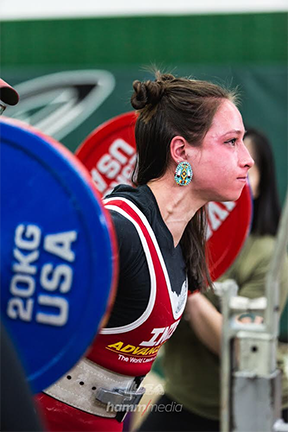
“Lastly, you have to be brave to get under a heavy barbell, squat down with it, and get up. More than that, you have to be brave enough to be confident with that weight on your back, in your hands, or suspended above your chest. My tribe’s value of bravery is endlessly helpful and guiding in this sport and it’s vital if I’m to keep improving,” added Jenesis.
“I plan on getting my Masters after I graduate from Carleton in Tribal Administration and Governance so that I can work for my community,” said Jenesis. “I’d also like to serve my community by promoting wellness through traditional avenues. So, I’d like to own or be a part of a gym centered in Indigenous wellness and health. I realize that powerlifting isn’t everyone’s cup of tea, but it might be someone’s, and there definitely isn’t a ton of representation or support for Indigenous powerlifters.”
Jenesis’s dad, Theron Founder, said: “As young girl she was always interested in physical fitness. I remember when she was just a little girl coming to the gym with me. When we would leave I’d let her do pull-ups and push-ups so she could feel like she worked out, too. I started teaching her how to work out with weights when she was about 10. I think her commitment to working hard has spilled over to all areas of her life. She is an over achiever and very motivated to accomplish all her goals. I see great things in her future because of her determination to succeed in all areas of her life.”
“Anyone can find power, physical and internal, through strength sports and it’s more than just a squat, bench, and deadlift,” said Jenesis. “It’s about community. Without the community, powerlifting would not still exist. Even though it is technically an individual sport, everyone learns from someone.”
Dan Ninham writers about Native Americans in sports. See more posts at: http://www.ndnsports.com/author/dan-ninham


